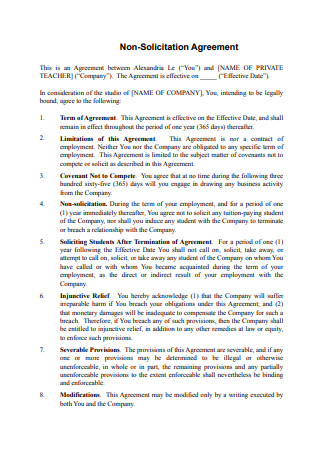In the competitive realm of business, non-solicitation agreements aim to protect employer interests by preventing employees from poaching clients or soliciting business from other colleagues. However, these agreements can sometimes seem like an insurmountable obstacle to career growth and entrepreneurial ambitions. Navigating this landscape requires a delicate balance of legal understanding and strategic thinking.

Image: www.sample.net
Non-solicitation agreements are commonly found in employment contracts, designed to safeguard against the divulgence of confidential information or the unfair exploitation of existing business relationships. While these agreements serve a legitimate purpose, they can also hinder individuals from pursuing opportunities that may benefit them and the broader industry. The question arises: are there ethical and legal means to circumvent these restrictions?
Understanding the Legality of Non-Solicitation Agreements
Non-solicitation agreements vary in legality depending on jurisdiction. In certain states, such agreements are strictly enforced, while others consider them to be partially or wholly unenforceable. The validity of these agreements hinges on factors such as the scope of the restrictions, the geographic limitations, and the duration of the agreement.
Exploring Legal Loopholes and Ethical Strategies
To navigate non-solicitation agreements effectively, it’s crucial to understand their limitations and explore legal loopholes without resorting to unethical practices.
-
Geographical and Temporal Restrictions: Non-solicitation agreements often impose geographical or temporal limitations. Determine the precise boundaries and time frame in which the agreement is applicable. Once the restrictions expire, you may be free to solicit business.
-
Non-Compete vs. Non-Solicitation: Non-compete agreements prohibit individuals from engaging in similar businesses altogether, while non-solicitation agreements merely restrict solicitation. Focus on activities that fall outside the scope of the non-solicitation clause, such as providing consulting services or pursuing unrelated industries.
-
Focus on Cold Outreach: Non-solicitation agreements typically prohibit contacting clients or colleagues with whom you had direct contact during your employment. Consider using cold outreach techniques to approach potential partners who were not previously connected with your previous company.
-
Ethical and Respectful Practices: Always prioritize integrity and respect for former colleagues. Avoid using confidential information acquired during your employment and adhere to ethical outreach practices. Focus on building genuine relationships and offering value to potential clients.
Seeking Professional Guidance
Navigating non-solicitation agreements can be complex and requires careful consideration of your specific circumstances. Consulting an experienced employment or business law attorney can provide valuable insights, assess the enforceability of your agreement, and recommend strategies that comply with both ethical and legal standards.
Conclusion
Non-solicitation agreements can pose challenges to career growth and entrepreneurial ventures. However, by understanding the legal landscape, exploring permissible loopholes, and adhering to ethical practices, individuals can navigate these restrictions without compromising their dreams or their integrity. Breaking the boundaries of non-solicitation agreements requires a thoughtful approach, strategic thinking, and unwavering determination to pursue opportunities that align with their passions and aspirations.

Image: dunkleberfan.blogspot.com
How To Get Around Non-Solicitation Agreements